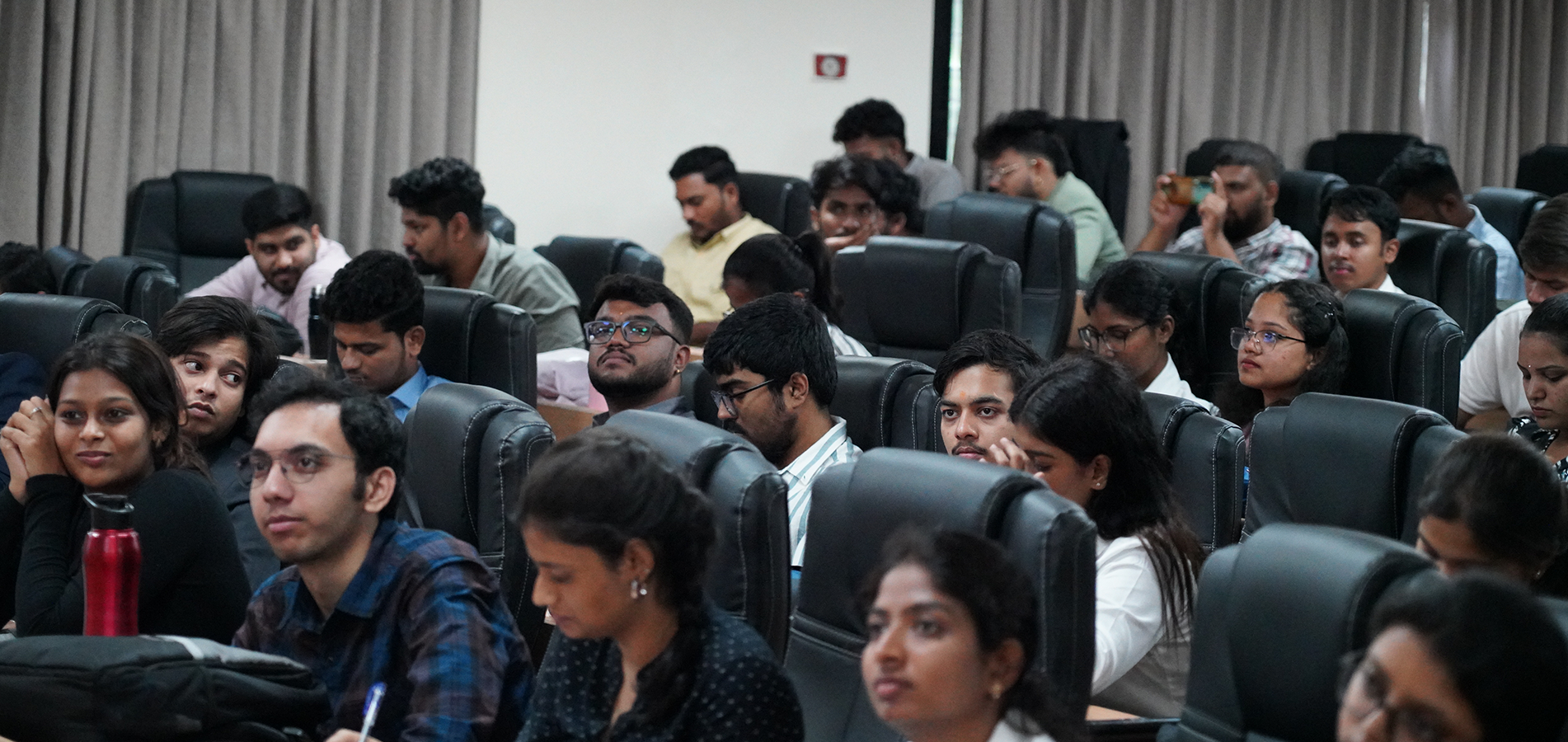2 Year’s Full Time Programme
NALSAR blends management, law, technology and analytics to prepare graduates who can navigate complex business environments.
In the first year, students cover foundational courses across General Management, Marketing, HR, Finance, Operations, Strategic Management, Data Analytics and Law.
The second year provides students with the opportunity to choose from a wide range of electives including entrepreneurship, sustainability, AI & data science, business ethics and cyber-security.
The programme structure consists of core and elective course credits, seminars and a master’s dissertation.

The NALSAR Management Entrance Test – Postgraduate (NMET-PG) shall be a comprehensive aptitude-based examination designed to assess candidates’ preparedness for postgraduate management education at NALSAR University of Law, Hyderabad. The test shall evaluate analytical ability, quantitative competence, language proficiency, and business awareness in line with the interdisciplinary and rigor-driven pedagogical framework of the Department of Management Studies (DoMS).
A) Language Ability & Logical Reasoning – 30% weightage
This section shall assess candidates’ proficiency in English language usage, reading comprehension, verbal reasoning, and logical thinking. It is intended to evaluate clarity of thought, critical comprehension, and reasoning ability essential for management studies.
B) Data Interpretation & Quantitative Ability – 40% weightage
This section shall test numerical aptitude, quantitative problem-solving skills, and the ability to interpret and analyze data. Emphasis shall be placed on accuracy, analytical rigor, and application-oriented quantitative reasoning relevant to managerial decision-making.
C) Business Aptitude – 30% weightage
This section shall assess candidates’ understanding of business fundamentals, economic awareness, organizational concepts, and contemporary business issues. It aims to evaluate managerial orientation, awareness of the business environment, and readiness for postgraduate management education.
The NMET-PG seeks to identify candidates with strong analytical capabilities, quantitative competence, language proficiency, and business acumen, who can thrive in NALSAR’s distinctive management education ecosystem that integrates management, law, governance, and ethics.
Online application available via the DoMS portal
Applicants must upload self-attested copies of marks/degree certificates, and entrance test score cards along with the application.
Foreign nationals and industry-sponsored candidates have specific application requirements (passport copy, endorsement etc.).
Admission is based on entrance test score (CAT/XAT/GMAT/NMET), statement of purpose (SOP), group discussion (GD) and personal interview (PI).
The weightage for the NMET/CAT/XAT/GMAT: 50 %
· SOP:10 %
· GD:20 %
· PI:20 %.
Short-listed candidates are called for GD and PI after fulfilling the entrance test criteria..
Total Seats: 132
75% All-India | 25% Telangana
30% Women | 5% PwD
Foreign Nationals: 26 seats
| Particulars | Amount |
|---|---|
| Tuition Fee | 215000 |
| Other Academic Fee | 100000 |
| Room Rent | 24000 |
| Internet Charges | 8000 |
| Electricity Charges | 12000 |
| Generator and Diesel Charges | 5000 |
| Water Charges | 12000 |
| Out Sourced Services | 3000 |
| Sports and Games Facilities Fee | 3000 |
| Mess Advance | 40000 |
| Refundable Deposits | |
| Hostel Deposit (For SC/ST Rs.4,000/-) | 10000 |
| Library Deposit | 5000 |
| Mess Deposit | 5000 |
| Total | 442000 |
| *Mess Advance is subject to upward revision |
Graduates of the MBA (Full-Time) programme are prepared for dynamic leadership roles across industries and sectors.
Learn More »The learning methodology at DoMS NALSAR combines academic rigor with practical exposure to prepare students for real-world business challenges.
Learn More »Career Prospects:
Teaching Methods:
| PARTICULARS | IMPORTANT DATES |
|---|---|
| Last Date to complete the online application form | February 28, 2026 |
| Nalsar Management Entrance Test (N-MET PG) (Online Proctored) | March 8, 2026 |
| GD, SOP & PI (Online) | March 8, 2026 |
| Declaration of Result / Merit list | March 15, 2026 |
| Acceptance of the offer by the Student | To be announced |
| Date of reporting to campus To Be Announced | To be announced |